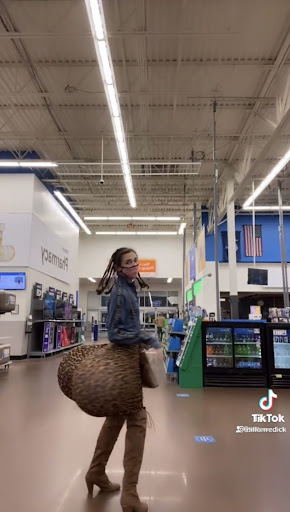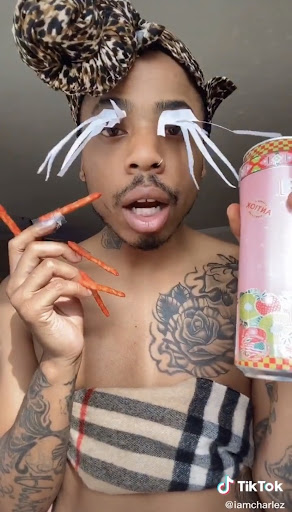
We need to discuss the modern caricatures of Black women and the bodies of Black femme-presenting people. This imagery is prevalent throughout the media and, most recently, on TikTok. As TikTok has become a dominant social media platform, many of us have personally witnessed multiple examples of people, of all races, including Black men, making fun of Black women’s bodies, mannerisms, and just Black women in general. One big example of how Black femme-presenting people are mocked is by exaggerating one’s hips and enlarging the breasts and butt to an unusual, and even unrealistic, size. These content creators do this to appear sassy and ghetto, which are basic stereotypes about Black women. These exaggerated features are being made fun of at the expense of Black women, just for non-Black people, and people who aren’t Black women to have a good laugh before going back to their daily scroll on TikTok.
I think the bigger issue and thing that really grinds my gears is the fact that people will go out of their way to defend the people that are mocking Black women’s bodies. They gaslight Black women to the end of time, in order to lessen their guilt. People will be in comments of TikToks calling out this behavior of mocking and mimicking Black women, gaslighting us, and talking about how “y’all complain about everything” or “all they’re doing is playing around, they aren’t mocking Black women!” We are not being dramatic when we say this mimicking of our bodies is wrong and horrible.
The fact of the matter is, this behavior of being obsessed with the Black women’s bodies while, at the same time, demonizing us for having big butts, big hips, and breasts is historic and stems from times way before social media! Many of us were never taught about a woman by the name of Sarah Baartman. Baartman was born in South Africa and, in short, was unwillingly taken to Europe and put on display because of her body and her big butt. They even renamed her “Hottentot Venus”. People labeled her as having something called, “steatopygia” which is essentially having this large butt. Due to her having this body that is so common in Black women and people being so fascinated with it, she was put in a London circus freak show- yes, a freak show. A place that was supposed to be filled with crazy acts and animals who performed had a Black woman as a showcase, because of her body. People touched her body, paid for demonstrations of her in their homes, and so much more horrible things. She wasn’t taken off display until 1974, 159 years after her death. Sara is a classic example of how the Black woman’s body has always been this thing that people praise, and also make fun of and shame. Her experience proves so many points, but in this case, it specifically shows how Black women’s features and our bodies have always been a harmful joke and something to laugh at for people, but is never actually funny to us.

Along with the mocking of Black women’s bodies, there has also been a recent surge in videos mocking young Black women specifically. All over Tik Tok, I’ve been seeing more and more videos making fun of young Black women for protective styles, wigs, makeup, nails, and the way young Black women speak. The term “Ghetto Girls” or “Hot Cheeto Girls” are the stereotypes often depicted by people who are not Black women. In these videos mocking Black women, people have fake long acrylic nails, wigs, or slick buns with edges, “messy” makeup, they overuse AAVE (using the words, “besfrand”, or “period”) to make fun of Black girls in middle school and high school. In the videos, people act sassy and have certain mannerisms pertaining to the stereotype of Black women. This behavior is also seen through microaggressions and microaggressive behavior that wouldn’t really be seen as racist or offensive. I’ve seen so many profile pictures all over the internet with long acrylic nails and a “sassy” face being used by people who are not Black women. Obviously, it’s not clear it is a Black woman, which many will argue, but through the nails and the facial expressions in certain profile pictures, it’s clear who is being mimicked and mocked.

Along with these videos, as I’ve mentioned before, gaslighting has been a huge part of it. There have been several people across the internet using the excuse that “not every Black woman is that way, so what’s so offensive?” when really, it is so much more than that. The things people are doing in these videos are active stereotypes being pushed about Black women and on to Black women. Though they may not be perceived as something that is meant to cause harm, videos mocking young Black women can cause a lot of self-esteem issues. I know for me, I had a hard time finding my identity, and still do, because of these videos. I know many other Black girls also feel the same way about making sure not to fit into this basic sassy and independent Black woman stereotype. Or maybe some of us do fit into it and are having self-esteem issues and issues with defining self-worth.
This whole idea of mocking Black women is the epitome of misogynoir. Though misogynoir is such a big topic, this unique experience of being a Black woman, or a Black person who is affected by misogyny, is shown through these constant trends of mocking Black women and what we do. No matter what we do or say, Black women will always be the butt of the joke, and this is clearly shown through the videos and trends all across the internet, centered around the sole fact that Black women are living their lives. Through it all, these videos show that Black women have no one but ourselves for support.